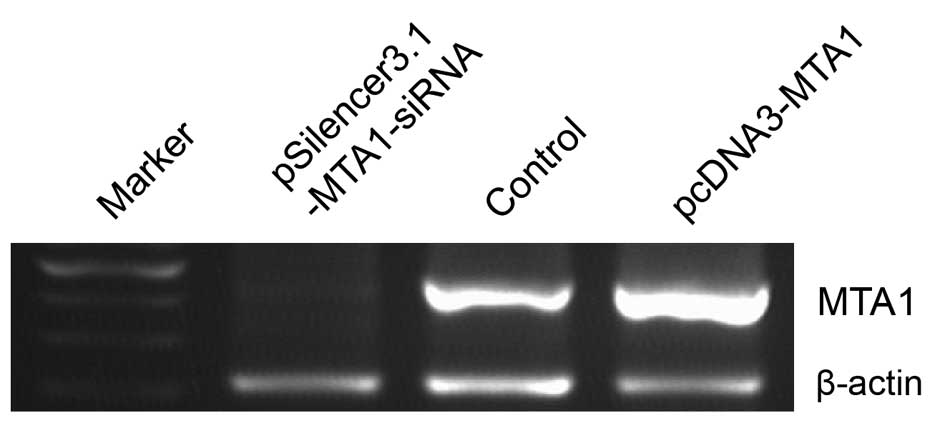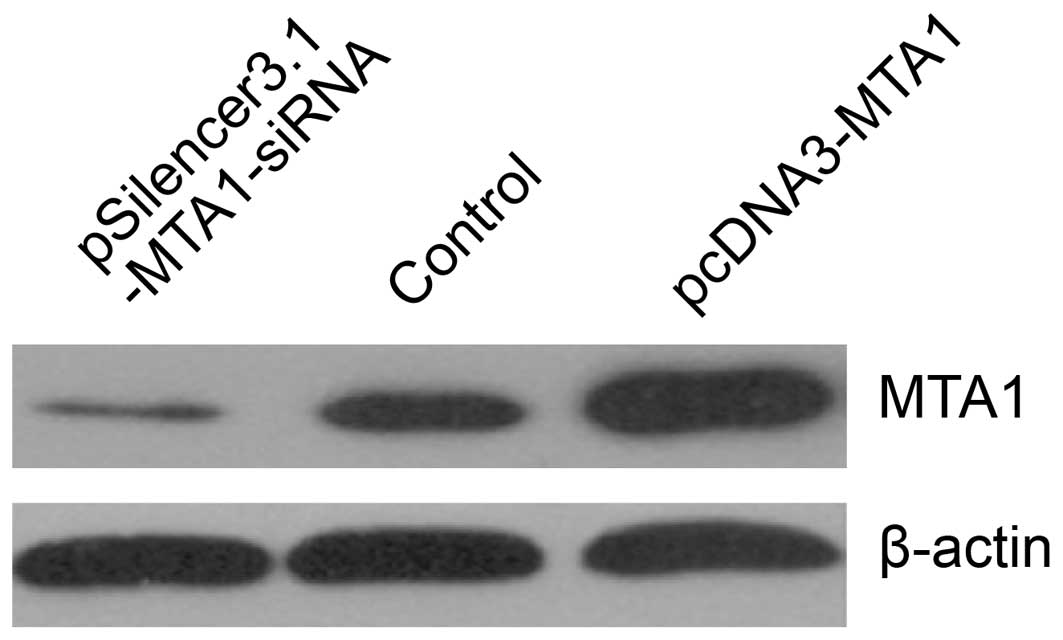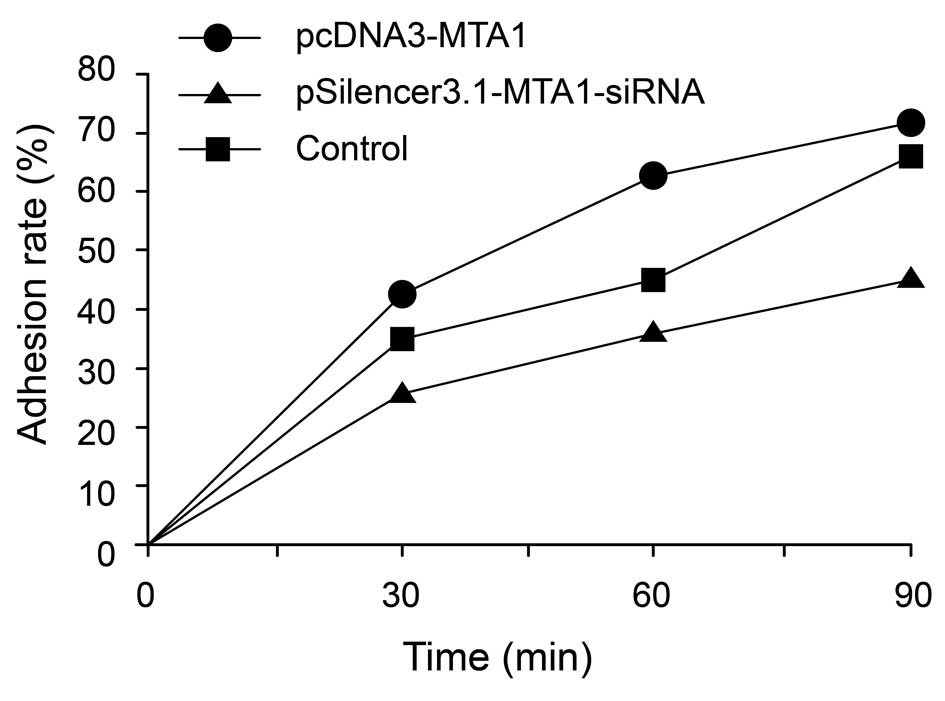|
1
|
Cattaruzza MS, Maisonneuve P and Boyle P:
Epidemiology of laryngeal cancer. Eur J Cancer B Oral Oncol.
32B:293–305. 1996. View Article : Google Scholar
|
|
2
|
Forastiere A, Koch W, Trotti A and
Sidransky D: Head and neck cancer. N Engl J Med. 345:1890–1900.
2001. View Article : Google Scholar
|
|
3
|
Greenlee RT, Hill-Harmon MB, Murray T and
Thun M: Cancer statistics. CA Cancer J Clin. 51:15–36. 2001.
|
|
4
|
Song IH: Cancer metastasis and metastasis
suppressors. Korean J Gastroenterol. 43:1–7. 2004.
|
|
5
|
Stracke ML and Liotta LA: Multi-step
cascade of tumor cell metastasis. In Vivo. 6:309–316.
1992.PubMed/NCBI
|
|
6
|
Toh Y, Pencil SD and Nicolson GL: A novel
candidate metastasis-associated gene, mta1, differentially
expressed in highly metastatic mammary adenocarcinoma cell lines.
cDNA cloning, expression, and protein analyses. J Biol Chem.
269:22958–22963. 1994.
|
|
7
|
Xue Y, Wong J, Moreno GT, Young MK, Côté J
and Wang W: NURD, a novel complex with both ATP-dependent
chromatin-remodeling and histone deacetylase activities. Mol Cell.
2:851–861. 1998. View Article : Google Scholar : PubMed/NCBI
|
|
8
|
Gururaj AE, Singh RR, Rayala SK, Holm C,
den Hollander P, Zhang H, Balasenthil S, Talukder AH, Landberg G
and Kumar R: MTA1, a transcriptional activator of breast cancer
amplified sequence 3. Proc Natl Acad Sci USA. 103:6670–6675. 2006.
View Article : Google Scholar : PubMed/NCBI
|
|
9
|
Qian H, Lu N, Xue L, Liang X, Zhang X, Fu
M, Xie Y, Zhan Q, Liu Z and Lin C: Reduced MTA1 expression by RNAi
inhibits in vitro invasion and migration of esophageal squamous
cell carcinoma cell line. Clin Exp Metastasis. 22:653–662. 2005.
View Article : Google Scholar : PubMed/NCBI
|
|
10
|
Qian H, Yu J, Li Y, Wang H, Song C, Zhang
X, Liang X, Fu M and Lin C: RNA interference of
metastasis-associated gene 1 inhibits metastasis of B16F10 melanoma
cells in a C57BL/6 mouse model. Biol Cell. 99:573–581. 2007.
View Article : Google Scholar : PubMed/NCBI
|
|
11
|
Sasaki H, Yukiue H, Kobayashi Y, Nakashima
Y, Kaji M, Fukai I, Kiriyama M, Yamakawa Y and Fujii Y: Expression
of the MTA1 mRNA in thymoma patients. Cancer Lett. 174:159–163.
2001. View Article : Google Scholar : PubMed/NCBI
|
|
12
|
Sasaki H, Moriyama S, Nakashima Y,
Kobayashi Y, Yukiue H, Kaji M, Fukai I, Kiriyama M, Yamakawa Y and
Fujii Y: Expression of the MTA1 mRNA in advanced lung cancer. Lung
Cancer. 35:149–154. 2002. View Article : Google Scholar : PubMed/NCBI
|
|
13
|
Zhang H, Stephens LC and Kumar R:
Metastasis tumor antigen family proteins during breast cancer
progression and metastasis in a reliable mouse model for human
breast cancer. Clin Cancer Res. 12:1479–1486. 2006. View Article : Google Scholar
|
|
14
|
Bagheri-Yarmand R, Talukder AH, Wang RA,
Vadlamudi RK and Kumar R: Metastasis-associated protein 1
deregulation causes inappropriate mammary gland development and
tumorigenesis. Development. 131:3469–3479. 2004. View Article : Google Scholar
|
|
15
|
Miyatani T, Kurita N, Mikami C, Kashihara
H, Higashijima J, Yoshikawa K, Nishioka M, Sato H, Iwata T and
Shimada M: Malignant potential of Barrett’s esophagus: special
reference to HDAC-1 and MTA-1 expression. Hepatogastroenterology.
58:472–476. 2011.
|
|
16
|
Park JO, Jung CK, Sun DI, Joo YH and Kim
MS: Relationships between metastasis-associated protein (MTA) 1 and
lymphatic metastasis in tonsil cancer. Eur Arch Otorhinolaryngol.
268:1329–1334. 2011. View Article : Google Scholar
|
|
17
|
Zhu X, Guo Y, Li X, Ding Y and Chen L:
Metastasis-associated protein 1 nuclear expression is associated
with tumor progression and clinical outcome in patients with
non-small cell lung cancer. J Thorac Oncol. 5:1159–1166. 2010.
View Article : Google Scholar : PubMed/NCBI
|
|
18
|
Mishra SK, Mazumdar A, Vadlamudi RK, Li F,
Wang RA, Yu W, Jordan VC, Santen RJ and Kumar R: MICoA, a novel
metastasis-associated protein 1 (MTA1) interacting protein
coactivator, regulates estrogen receptor-alpha transactivation
functions. J Biol Chem. 278:19209–19219. 2003. View Article : Google Scholar
|
|
19
|
Yoo YG, Kong G and Lee MO:
Metastasis-associated protein 1 enhances stability of
hypoxia-inducible factor-1alpha protein by recruiting histone
deacetylase 1. EMBO J. 25:1231–1241. 2006. View Article : Google Scholar
|
|
20
|
Li SH, Tian H, Yue WM, Li L, Li WJ, Chen
ZT, Hu WS, Zhu YC and Qi L: Overexpression of metastasis-associated
protein 1 is significantly correlated with tumor angiogenesis and
poor survival in patients with early-stage non-small cell lung
cancer. Ann Surg Oncol. 18:2048–2056. 2011. View Article : Google Scholar
|
|
21
|
Ghanta KS, Li DQ, Eswaran J and Kumar R:
Gene profiling of MTA1 identifies novel gene targets and functions.
PLoS One. 6:e171352011. View Article : Google Scholar : PubMed/NCBI
|
|
22
|
Xu L, Mao XY, Fan CF and Zheng HC: MTA1
expression correlates significantly with cigarette smoke in
non-small cell lung cancer. Virchows Arch. 459:415–422. 2011.
View Article : Google Scholar
|
|
23
|
Cui FL, Gong DD, Zhou YJ, Zhu L and Fan Y:
Regulatory effect of MTA1 on the anoikis of human prostate cancer
cells. Zhonghua Nan Ke Xue. 17:427–430. 2011.(In Chinese).
|
|
24
|
Mazumdar A, Wang RA, Mishra SK, Adam L,
Bagheri-Yarmand R, Mandal M, Vadlamudi RK and Kumar R:
Transcriptional repression of oestrogen receptor by
metastasis-associated protein 1 corepressor. Nat Cell Biol.
3:30–37. 2001. View Article : Google Scholar : PubMed/NCBI
|
|
25
|
Kumar R, Wang RA, Mazumdar A, Talukder AH,
Mandal M, Yang Z, Bagheri-Yarmand R, Sahin A, Hortobagyi G, Adam L,
et al: A naturally occurring MTA1 variant sequesters oestrogen
receptor-alpha in the cytoplasm. Nature. 418:654–657. 2002.
View Article : Google Scholar : PubMed/NCBI
|
|
26
|
Li DQ, Pakala SB, Reddy SD, Ohshiro K,
Peng SH, Lian Y, Fu SW and Kumar R: Revelation of p53-independent
function of MTA1 in DNA damage response via modulation of the p21
WAF1-proliferating cell nuclear antigen pathway. J Biol Chem.
285:10044–10052. 2010. View Article : Google Scholar : PubMed/NCBI
|
|
27
|
Li DQ, Ohshiro K, Khan MN and Kumar R:
Requirement of MTA1 in ATR-mediated DNA damage checkpoint function.
J Biol Chem. 285:19802–19812. 2010. View Article : Google Scholar : PubMed/NCBI
|
|
28
|
Deng Y, Zhou D and Zeng L: Expression and
significance of MTA1 and RECK gene in nasopharyngeal carcinoma. Lin
Chung Er Bi Yan Hou Tou Jing Wai Ke Za Zhi. 25:534–538. 2011.(In
Chinese).
|
|
29
|
Jiang Q, Zhang H and Zhang P:
ShRNA-mediated gene silencing of MTA1 influenced on protein
expression of ER alpha, MMP-9, CyclinD1 and invasiveness,
proliferation in breast cancer cell lines MDA-MB-231 and MCF-7 in
vitro. J Exp Clin Cancer Res. 30:602011. View Article : Google Scholar
|
|
30
|
Rao Y, Wang H, Fan L and Chen G: Silencing
MTA1 by RNAi reverses adhesion, migration and invasiveness of
cervical cancer cells (SiHa) via altered expression of p53, and
E-cadherin/β-catenin complex. J Huazhong Univ Sci Technolog Med
Sci. 31:1–9. 2011.PubMed/NCBI
|
|
31
|
Hofer MD, Kuefer R, Varambally S, Li H, Ma
J, Shapiro GI, Gschwend JE, Hautmann RE, Sanda MG, Giehl K, et al:
The role of metastasis-associated protein 1 in prostate cancer
progression. Cancer Res. 64:825–829. 2004. View Article : Google Scholar : PubMed/NCBI
|
|
32
|
Toh Y, Ohga T, Endo K, Adachi E, Kusumoto
H, Haraguchi M, Okamura T and Nicolson GL: Expression of the
metastasis-associated MTA1 protein and its relationship to
deacetylation of the histone H4 in esophageal squamous cell
carcinomas. Int J Cancer. 110:362–367. 2004. View Article : Google Scholar : PubMed/NCBI
|
|
33
|
Kumar R, Wang RA and Bagheri-Yarmand R:
Emerging roles of MTA family members in human cancers. Semin Oncol.
30(5 Suppl 16): 30–37. 2003. View Article : Google Scholar : PubMed/NCBI
|
|
34
|
Kai L, Wang J, Ivanovic M, Chung YT,
Laskin WB, Schulze-Hoepfner F, Mirochnik Y, Satcher RL Jr and
Levenson AS: Targeting prostate cancer angiogenesis through
metastasis-associated protein 1 (MTA1). Prostate. 71:268–280. 2011.
View Article : Google Scholar
|
|
35
|
Denlinger CE, Keller MD, Mayo MW, Broad RM
and Jones DR: Combined proteasome and histone deacetylase
inhibition in non-small cell lung cancer. J Thorac Cardiovasc Surg.
127:1078–1086. 2004. View Article : Google Scholar : PubMed/NCBI
|
|
36
|
Warrell RP Jr, He LZ, Richon V, Calleja E
and Pandolfi PP: Therapeutic targeting of transcription in acute
promyelocytic leukemia by use of an inhibitor of histone
deacetylase. J Natl Cancer Inst. 90:1621–1625. 1998. View Article : Google Scholar : PubMed/NCBI
|
|
37
|
Phillips T, Collins T and Davies J:
American Association for Cancer Research - 96th Annual Meeting.
Targeting the cell cycle and HDAC inhibitors. IDrugs. 8:450–453.
2005.PubMed/NCBI
|





















